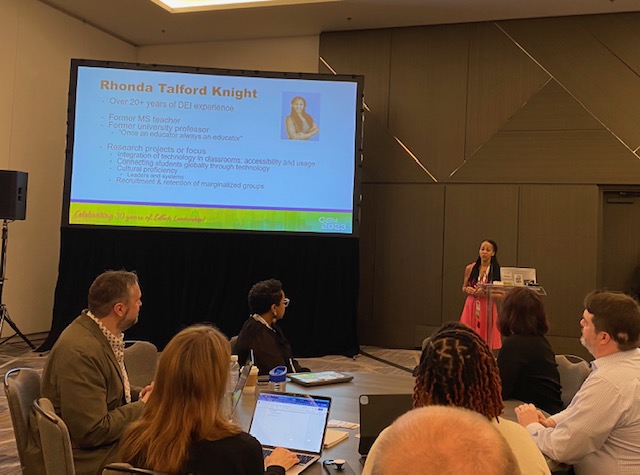Diversity, Equity, and Inclusion: Three Essential Questions
At CoSN’s 30th anniversary 2023 conference in Austin, attendees gathered for the second annual meeting of “The Network” to discuss what DEI looks like in practice in their companies and school districts - and what more work needs to be done.
Diversity, Equity, and Inclusion (DEI) was one of the key themes at this year’s 30th anniversary CoSN conference in Austin, where district administrators and industry partners gathered for one of the biggest CoSN conferences to date. In addition to celebrating this important anniversary milestone (find the timeline of CoSN’s 30-year impact to date here), this hybrid event offered dozens of in-person sessions and activities, along with virtual sessions for those who could not attend in person.
The CoSN conference agenda was again rich with content, and the association’s commitment to DEI was evident in programming dedicated to this effort. Events included: The CIOs Guide to Allyship: How to Overcome Fear and Embrace Mistakes, an LGBTQ+ session and Reception, Women in Technology Breakfast, and The Network Meetup: Brought to you by CoSN’s Diversity, Equity & Inclusion Committee.

The Network Meetup
At the second annual “Network Meetup,” hosted by CoSN’s DEI committee, about 100 attendees gathered for this informal conversation, held in small groups, in which we explored the following questions:
- Why is it important to build a pipeline and recruit talent from underrepresented groups?
- Where can you go to find talent and build a pipeline of underrepresented groups?
- How might you retain talent from underrepresented groups?
What follows are some of the highlights captured during these small group discussions:
The IT Pipeline: Why is it important to build a pipeline and recruit talent from underrepresented groups?
CoSN’s recent survey data found that there is still work to be done to diversify CTO representation: in 2016, the number of CTOs identifying as female was 36%, with 64% identifying as male; in the 2023 survey, this number dropped to 33% of CTOs who identified as female and 65% identifying as male (2% prefer not to answer). Here are some of the reasons small groups answered the questions: why is it important to build a pipeline and recruit talent from underrepresented groups?
- Students are less likely to become what they don’t see
- Representation matters
- The bottom line may be improved
- Diversity of experiences and opinion adds to the team
- Provide opportunities for community members
The IT Pipeline: Where to go to find talent and build a pipeline of underrepresented groups
Tools and ideas to transform education. Sign up below.
We often hear that we don’t get diverse applicants for open positions, but are we truly being intentional in our outreach efforts? Below are ideas shared in the small group discussions:
- Unless a district is intentional about how they go about finding people, nothing will change. Don’t just post a job on the school website. Go into the underrepresented communities to share career opportunities through channels consumed by these communities (local papers, churches, libraries, etc.). This is not only HR’s responsibility – leadership must drive this intentionality.
- There needs to be an organizational philosophy driving the work; it’s a conversation for HR across all types of positions in a district
- Start getting students excited about tech careers in elementary school – by middle school, we’re already losing girls, for example.
- Leadership needs to step back far enough to recognize ways they are creating “pockets” of divisive categories– e.g. Magnet, AP, CTE, GT (further incentivized because there is funding associated with each kid/these category – e.g. CTE)
- Create opportunities to come to work right from high school without needing higher education. Craft job postings that lower barriers to entry (ex: requiring certifications for a position). Adjust job descriptions to focus on skills (not jargon) so people can see themselves in the role.
- Partner with your community institutions and high schools to build pipelines and use your community to drive building connections. Partnerships can include: HBCUs (here's a great resource, HBCU Connect), community colleges, technical schools, training centers, and local veteran groups.
- Build mentorship/internship programs such as cybersecurity academies to help students be prepared for college, careers, and to work in the district. Teach students networking skills and IT support while in high school.

The IT Pipeline: The How to retain talent from underrepresented groups
How can we support our hiring committees to ensure they are retaining staff from underrepresented groups? Here are ideas shared in the small group discussions:
- Create an environment and culture in which underrepresented staff want to stay and grow.
- Make your environment into a space in which all staff (especially under represented staff) want to come to everyday.
- Train the leaders in your technology teams to use inclusive practices so that everyone on the teams is heard, is intentionally involved, and feels ownership over goals.
- Create unstructured spaces that underrepresented staff can be together within and build community.
- Encourage leaders to model inclusion for underrepresented staff without tokenizing and creating situations that ‘othering’ will thrive.
- Provide intentional mentoring through which underrepresented staff can see themselves in the future.
- Create affinity groups and build allyships, especially when you are one of few staff from underrepresented groups. Be an ally and activist when toxic thoughts are brought into the culture and work to remove it.
- Provide development and leadership opportunities to advance those and help develop their skills to retain talent, including mentoring opportunities.
- Provide financial support and time for certifications; support upskilling.
- Keep in mind that many certification exams are not constructed with all learners/takers in mind. A lack of success on the exam does not necessarily indicate lack of knowledge and skill in that area. Non-passing scores should result in conversations, support, and mentoring - not a threat to jobs.
- Policies & Practices - rethink and reevaluate all of them.
- Allow people to build their network within the department to facilitate trust being forged between team members.
- Give your team autonomy and listen to their ideas and plans. Allow them to be leaders. Understand people's mindset and provide direction.
As you reflect on your district or company’s hiring and staff retention practices, how are you addressing the Why, Where, and How to ensure you are diversifying your staff? Where are you creating new opportunities?
If you'd like to share some of your DEI successes and challenges, please drop me an email at christine.weiser@futurenet.com.
Christine Weiser is the Content and Brand Director for Tech & Learning, and has been with the company since 2008. She has reported on education for most of her career, working at Scholastic and Gale Publishing before joining Tech & Learning. Christine is also an author and musician, and lives in Philadelphia with her husband and son.
